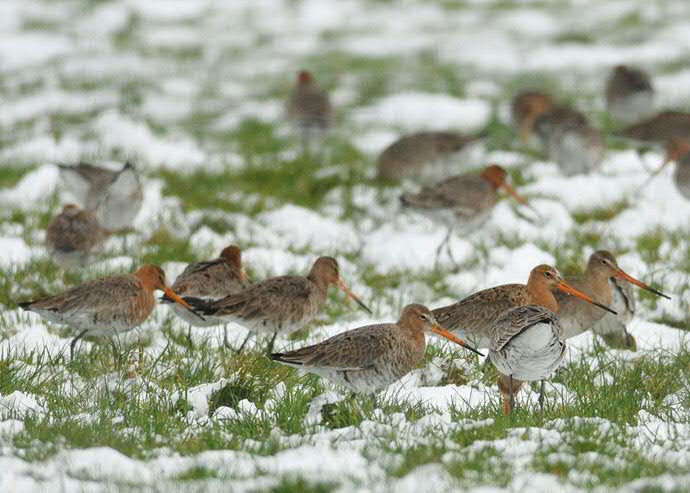Grutto’s maken een succes van extreem koud voorjaar 2013

Grutto’s kunnen een aardig stootje hebben van het wispelturige weer. Dat blijkt uit een grondige analyse van het bijzondere voorjaar van 2013 door dierecoloog Nathan Senner van de Rijksuniversiteit Groningen en een internationale groep collega’s. In 2013 werden de grutto’s na aankomst in Nederland verrast door een uitzonderlijk koud voorjaar. Veel vogels blijken tijdelijk terug te zijn getrokken naar iets warmere oorden. Niettemin hadden de grutto’s dat jaar uiteindelijk een bovengemiddeld productief broedseizoen, schrijft Senner in Journal of Animal Ecology, dat 29 mei 2015 is verschenen.
In maart 2013 daalden de temperaturen in grote delen van West-Europa plotseling meer dan tien graden. Er volgde een periode van drie weken met extreem lage temperaturen en grote hoeveelheden sneeuw, zelfs tot in het midden van Frankrijk.
Uitstel
Uit de waarnemingen van geringde grutto’s bleek dat een deel van de vogels de aankomst in hun broedgebieden met meer dan drie weken uitstelde. Een ander deel vertrok vanuit het ongewoon koude Friesland zo’n 250 kilometer terug zuidwaarts. Daarnaast namen Senner en collega’s waar dat de vogels die in Friesland bleven ruim een derde meer tijd dan normaal besteedden aan voedsel zoeken.
Positief effect
Niettemin brachten de grutto’s in 2013 meer jongen groot dan in andere jaren. In het Friese onderzoeksgebied overleefde bijvoorbeeld 51% van de jongen het voorjaar, tegenover 30% in 2014. Het ogenschijnlijk positieve effect van het extreme voorjaar van 2013 verklaart Senner uit een betere match tussen het verschijnen van insecten in het grasland en het opgroeien van de gruttokuikens. ‘Er zijn duidelijke aanwijzingen dat door het veranderde klimaat de insecten tegenwoordig te vroeg pieken voor grutto-pullen’, zegt Senner. ‘Die “mismatch” was in 2013 minder groot.’
Weidevogelreservaten
Het lijkt er dus op dat grutto’s wel tegen een stootje van extreem weer kunnen. ‘Dat is goed nieuws, omdat de klimaatmodellen voorspellen dat er steeds vaker extreem weer zal voorkomen’, vindt Senner. ‘Maar je moet je wel realiseren dat de vogels extra moesten eten om deze situaties op te vangen. Ze deden dat met name in weidevogelreservaten. De vogels die terugvlogen richting het zuiden verbleven ook vooral in weidevogelreservaten. De flexibiliteit van de grutto is dus weliswaar goed nieuws, maar dan moeten er wel voldoende hoog-kwalitatieve leefgebieden beschikbaar zijn waar de vogels naar uit kunnen wijken.’
Vrijwilligers
Het onderzoek kon gedaan worden dankzij heel veel vrijwillige waarnemers die gekleurringde grutto’s in het veld observeerden, hun waarnemingen noteerden en doorgaven. ‘In totaal zijn bijna 600 geringde grutto’s gerapporteerd tijdens het voorjaar van 2013. ‘De vrijwillige waarnemers zijn absoluut onmisbaar in dit werk’, benadrukt de onderzoeker.
Nadere informatie:
-
Contact: dr. Nathan Senner , n.r.senner rug.nl of onderzoeksleider en laatste auteur prof.dr. Theunis Piersma , Theunis.Piersma nioz.nl . Nathan Senner verblijft tot 30 juli in Illinois, VS, en is behalve via e-mail te bereiken via skype nrsenner, tel. 503-688-8735 .
-
Het artikel When Siberia came to The Netherlands: the response of continental black-tailed godwits to a rare spring weather event is online te lezen op Journal of Animal Ecology .
Nathan R. Senner1, Mo A. Verhoeven1, José M. Abad-Gómez2, Jorge S. Gutiérrez2,3, Jos C. E. W. Hooijmeijer1, Rosemarie Kentie1, José A. Masero2, T. Lee Tibbitts4 andTheunis Piersma1,3
1 Animal Ecology Group, Groningen Institute for Evolutionary Life Sciences (GELIFES), University of Groningen; 2Department of Marine Ecology, NIOZ Royal Netherlands Institute for Sea Research; 3Conservation Biology Research Group, Department of Anatomy, Cell Biology and Zoology, University of Extremadura, Spain; 4U.S. Geological Survey Alaska Science Center, Anchorage, Alaska, USA
Meer nieuws
-
29 januari 2026
Microplasticonderzoek - opgeblazen nieuws of een echt gevaar?
-
27 januari 2026
ERC Proof of Concept grant voor Maria Loi
